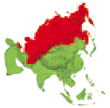DK People & Places: Russian Federation & Central Asia
The Asian part of the Russian Federation is a land of bleak, frozen tundra and cold conifer forest. To the south and west are windswept grasslands known as the steppes, rugged, mountainous plateau, and arid deserts.
The ancient Islamic city of Samarkand lies on the Silk Road, an ancient trading route that linked China with central Asia, the Middle East, and Europe. Samarkand was once the center for China’s silk trade, and the manufacture of silk and cotton textiles is still the city’s main industry.
In the grasslands of central Asia, many people breed animals and move from place to place searching for fresh pasture. In Afghanistan, for example, sheep-herders are nomadic. They live in tents with very few belongings, surviving on their animals’ milk, meat, and wool and selling the excess in towns and cities.
The Trans-Siberian Railroad, the world’s longest continuous rail line, crosses the Russian Federation. It starts in Moscow and runs 5,870 miles (9,446 km) to the Pacific port of Vladivostok. The whole journey crosses eight time zones and takes eight days to complete.
Siberia, a vast, bitterly cold region of tundra, pine forest, rivers, and lakes, is sparsely populated. The Yakut and other native peoples survive there by hunting, fishing, and herding reindeer. Siberia stretches from the Ural Mountains in the west to the Pacific Ocean in the east. The region is rich in natural resources, such as coal, oil, gas, diamonds, and gold.
The Aral Sea in Uzbekistan and Kazakhstan was once the world’s fourth-largest freshwater lake. Today it is shrinking at an alarming rate because the rivers that feed it, the Syr Darya and the Amu Darya, have been diverted to irrigate cotton fields. A fishing village that once stood on the lake’s banks now stands 30 miles (48 km) from the shore.
Capital city: T’bilisi
Area: 26,911 sq miles (69,700 sq km)
Population: 5.2 million
Official languages: Georgian and Abkhazian (in Abkhazia)
Capital city: Yerevan
Area: 11,506 sq miles (29,800 sq km)
Population: 3.8 million
Official language: Armenian
Capital city: Baku
Area: 33,436 sq miles (86,600 sq km)
Population: 8.1 million
Official language: Azerbaijani
Capital city: Astana
Area: 1,049,150 sq miles (2,717,300 sq km)
Population: 16 million
Official language: Kazakh
Capital city: Ashgabat
Area: 188,455 sq miles (488,100 sq km)
Population: 4.9 million
Official language: Turkmen
Capital city: Kabul
Area: 250,000 sq miles (647,500 sq km)
Population: 23.3 million
Official languages: Pashtu and Dari
Capital city: Tashkent
Area: 172,741 sq miles (447,400 sq km)
Population: 25.6 million
Official language: Uzbek
Capital city: Dushanbe
Area: 55,251 sq miles (143,100 sq km)
Population: 6.2 million
Official language: Tajik
Capital city: Bishkek
Area: 76,641 sq miles (198,500 sq km)
Population: 5 million
Official languages: Kyrgyz and Russian

